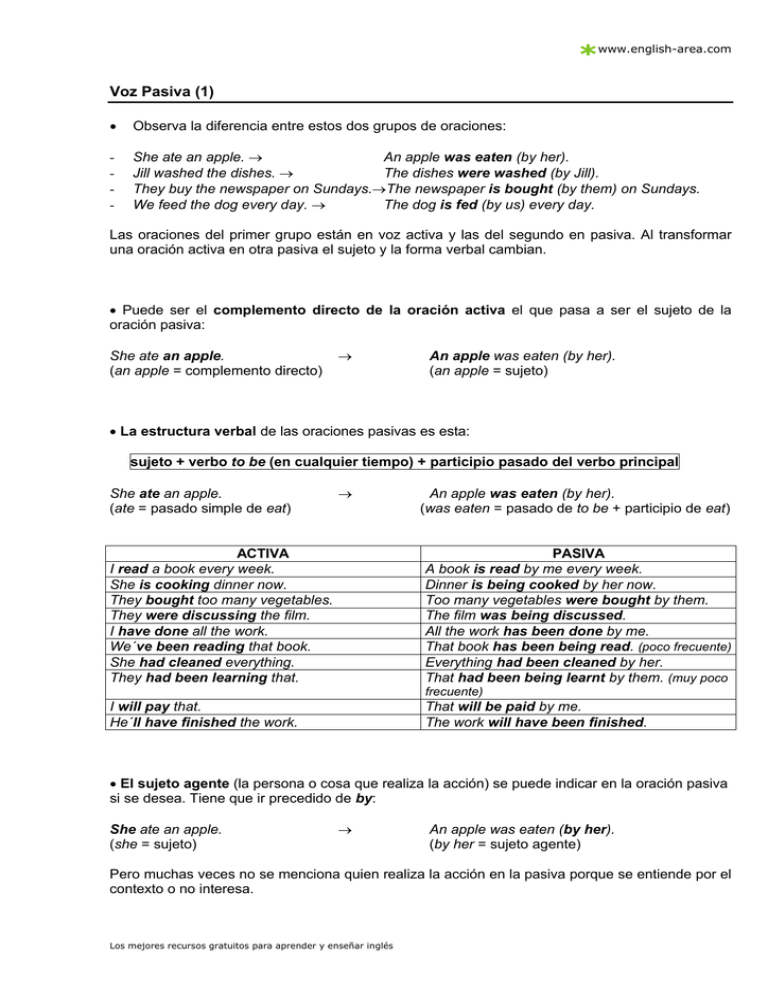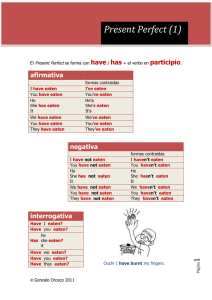Teoría Voz Pasiva 1
Anuncio

www.english-area.com Voz Pasiva (1) • Observa la diferencia entre estos dos grupos de oraciones: - She ate an apple. → An apple was eaten (by her). Jill washed the dishes. → The dishes were washed (by Jill). They buy the newspaper on Sundays.→The newspaper is bought (by them) on Sundays. We feed the dog every day. → The dog is fed (by us) every day. Las oraciones del primer grupo están en voz activa y las del segundo en pasiva. Al transformar una oración activa en otra pasiva el sujeto y la forma verbal cambian. • Puede ser el complemento directo de la oración activa el que pasa a ser el sujeto de la oración pasiva: She ate an apple. (an apple = complemento directo) → An apple was eaten (by her). (an apple = sujeto) • La estructura verbal de las oraciones pasivas es esta: sujeto + verbo to be (en cualquier tiempo) + participio pasado del verbo principal She ate an apple. (ate = pasado simple de eat) → ACTIVA I read a book every week. She is cooking dinner now. They bought too many vegetables. They were discussing the film. I have done all the work. We´ve been reading that book. She had cleaned everything. They had been learning that. An apple was eaten (by her). (was eaten = pasado de to be + participio de eat) PASIVA A book is read by me every week. Dinner is being cooked by her now. Too many vegetables were bought by them. The film was being discussed. All the work has been done by me. That book has been being read. (poco frecuente) Everything had been cleaned by her. That had been being learnt by them. (muy poco frecuente) I will pay that. He´ll have finished the work. That will be paid by me. The work will have been finished. • El sujeto agente (la persona o cosa que realiza la acción) se puede indicar en la oración pasiva si se desea. Tiene que ir precedido de by: She ate an apple. (she = sujeto) → An apple was eaten (by her). (by her = sujeto agente) Pero muchas veces no se menciona quien realiza la acción en la pasiva porque se entiende por el contexto o no interesa. Los mejores recursos gratuitos para aprender y enseñar inglés www.english-area.com • El complemento indirecto de una oración activa puede convertirse también en el sujeto de una oración pasiva, algo que no es posible en español: His parents gave him a present. → (him = CI, a present = CD) He was given a present by his parents. A present was given to him by his parents. Otros ejemplos: - They told her the truth → She was told the truth. He paid me → I was paid by him. They sent him a letter → He was sent a letter. • La voz pasiva se usa con mucha más frecuencia en inglés que en español. • No todos los verbos se pueden utilizar en voz pasiva. Ésta es sólo posible con los verbos transitivos, es decir, con aquellos que necesitan ir acompañados de un complemento directo. Ejemplos de oraciones que sólo son posibles en voz activa: - I went to the cinema. She´ll become a doctor when she grows up. We aren´t happy in this company. Los mejores recursos gratuitos para aprender y enseñar inglés
